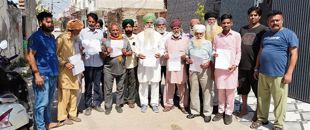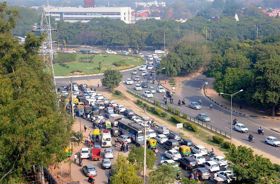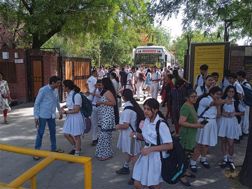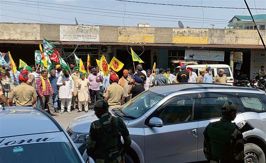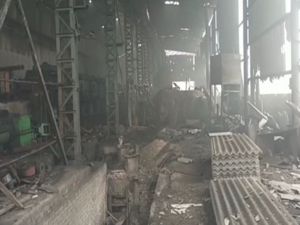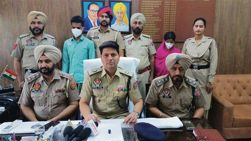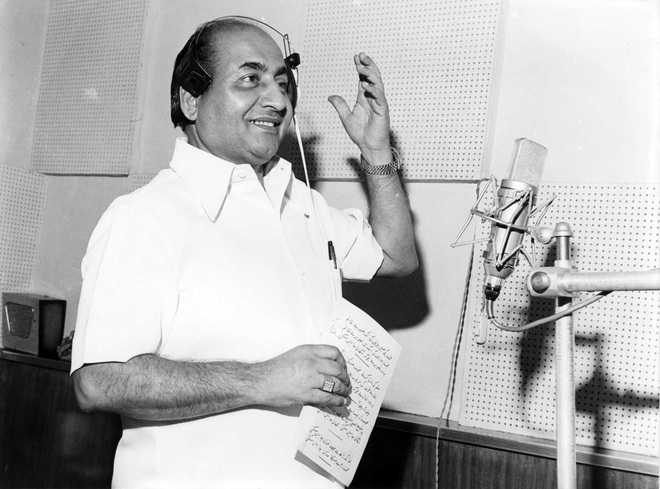
Mohd Rafi’s death anniversary falls on July 31.
Bhim Raj Garg
A young Pheeku was casually singing Waris Shah’s Heer when Pandit Jiwan Lal Mattoo of All India Radio, Lahore, discovered him. He took him under his wings, gave him training in classical music and honed the talent of the lad who the world would come to know as Mohammed Rafi. His singing talent was to be recognised on a grand scale during a performance at the All-India Exhibition, Lahore, in 1937. Present at the occasion was KL Saigal, who had predicted then and there that the young man would become a singing sensation. And he did, and he remains a singing superstar 40 years after he became one with the stars.
Rafi was born in a small village, Kotla Sultan Singh, of Amritsar. With his rich tonal voice, versatility and crystal clear intonations, he rendered thousands of unique heart-wrenching songs, varying from fast, peppy numbers to classical songs, heartrending melodies to romantic songs, qawwalis to ghazals and bhajans to patriotic songs. Rafi’s mellifluous voice boomed not only across India but around the world. However, it is the inseparable connection between him and Punjab that we talk about today.

Rafi was introduced to filmdom by music director Shyam Sunder in 1942. His first song was a duet, “Pardesi…Sohneya Oye, Heeriye Oye” with Zeenat Begum in a Punjabi movie Gul Baloch (1945). Rafi sang another duet, “Aa Chann Ve”, with Munawar Sultana under Lachhi Ram and a chorus, “Sun Sun Nikki Jehi Gall”, under the music direction of Pt Amar Nath. His songs became very popular even before the release of Gul Baloch on August 23, 1946. The rest, as they say, is history.
Bombay beckoned soon and actor-producer Nazeer paid him Rs100 and a rail ticket from Lahore to Bombay. The story of Rafi’s first recording as narrated by Naushad goes like this: “In order to give a marching effect to the patriotic song, “Hindustan Ke Hum Hain” (Pehle Aap, 1944), he asked the chorus singers to wear heavy military shoes and sing the song making a rhythmic sound by hitting the booted legs in unison. After the recording, Rafi’s feet were bleeding but his face was glowing with the joy of singing his first song in a Hindi movie.” However, some say Rafi’s first Hindi film song was “Jab Dil Ho Kaabu Mein” (Gaon Ki Gori, 1945).

and son Khalid.
A successful Bollywood outing had kicked off, but Rafi was extremely nostalgic about his Punjabi roots. Love for his land led him to record many Punjabi folk and film songs and shabads from Gurbani. Following Partition of India, he devoted equally to playback singing in Hindi and Punjabi movies. He rendered 262 songs in 105 Punjabi movies. He recorded five songs in Punjabi film Lachhi (1949) under the music direction of Hansraj Behl. His solo, “Jag Wala Mela Yaaro”, went on to become immensely popular on both sides of the border. His duets with Lata Mangeshkar, “Kaali Kangi Naal” and “Tumba Vajdae Na”, also made it to the top of the musical charts. He became the most sought-after playback singer in Punjabi cinema.
In 1951, he sang three songs under Sardul Kwatra and his duet with Asha Bhosle, “Tun Peengh Te Main Parchhavan”, hit the bull’s eye. Punjab was still reeling under the pain of Partition when his philosophical rendering, “Darh Vatt Zamana Katt Bhale Din Aawange” (Jugni, 1953), was released, offering a healing touch.
By now, Rafi had become a force to reckon with in Hindi cinema and found little time for Punjabi movies. However, he made a comeback with “Jatt Kudiyaan Ton Darda Mara” (Bhangra, 1959). Next year, he gave voice to dance director Sohan Lal Khanna’s popular bhangra number “Teri Kanak Di Raakhi Mundiya” (Do Lachhian).

Apart from Punjabi film music, Rafi cut many records of non-film songs, Punjabi folk, shabads, naats, etc. A 78 rpm record of two shabads from the 1950s, “Har Ko Naam Sada Sukhdai” and “Jis Sar Upar Tu Swami”, became an all-time hit and was regularly played from the community loudspeakers in village gurdwaras in the mornings.
His heart in the right place, Rafi’s conversations at home and in private circles were always in Punjabi. If any, there was one wish that remained unfulfilled: a chance to go to Lahore. A performance was cancelled due to the Indo-China War and he was always remorseful about it.
Join Whatsapp Channel of The Tribune for latest updates.





















